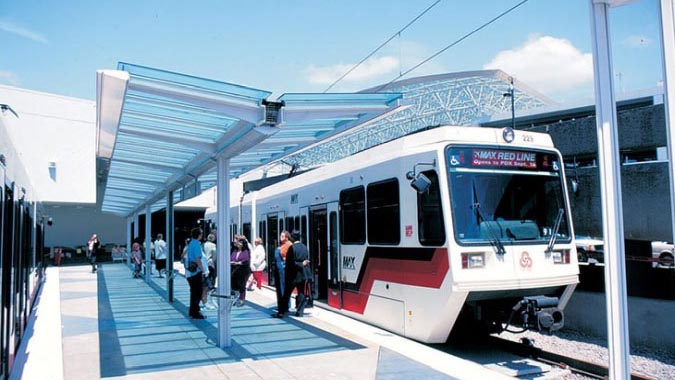
photo credit: TriMet
| Location | Portland, Oregon |
|---|---|
| Project Sponsor / Borrower | Tri-County Metropolitan Transportation District of Oregon (TriMet) / City of Portland |
| Program Areas |
|
| Mode | Light Rail Transit |
| Description | The Airport MAX is a 5.5-mile light rail extension to Portland's existing Red Line, connecting Downtown Portland to the Portland International Airport (PDX). The extension opened to revenue service in 2001 as the first train-to-plane transit service on the West Coast. The project was built through a unique public-private partnership, which delivered the project under budget and within just five years. In 1997, Bechtel Enterprises approached the City of Portland, Port of Portland, and TriMet to jointly develop the extension. As part of a public-private partnership, Bechtel Enterprises funded $28.2 million (23 percent) of the extension's $125.8 million project costs, delivered the extension under a design-build contract, and received an 85-year, rent-free lease to develop a 120-acre mixed-use commercial site near the airport. The land was owned by the Port of Portland and later became known as Cascade Station. Bechtel's 23 percent contribution to the project was financed through an innovative arrangement, involving the Portland Development Commission (PDC), the Port of Portland, and TriMet. The Port of Portland granted development rights to the land, TriMet issued $28.2 million in bonds, Bechtel assumed responsibility of the bonds, and PDC gave Bechtel development rights to the land. Total compensation for Bechtel would be the value of its design-build contract ($125 million) and any profits resulting from its real estate efforts at Cascade Station. In order to break even on the deal, the value of Bechtel's real estate profits would have to exceed $28.2 million. Cascade Station is located within the Airport Way Urban Renewal Area, which functions as a form of Tax Increment Financing (TIF). Taxes over the base amount are collected by the City of Portland and reinvested in the area. The City of Portland issued $23.8 million in bonds for its portion of project costs, backed by incremental revenues from the Airport Way Urban Renewal Area. The Port was able to fund its $28.3 million portion through its Passenger Facility Charge (PFC). At the time, a PFC included a flat $3.00 fee that airlines paid to the Port for each passenger that boarded a plane at PDX. Revenues from the PFC can only be used for designated purposes that are approved by the Federal Aviation Administration. The Federal Aviation Administration granted special approval for the funds to be used for the extension. Bechtel ultimately sold its development rights to Trammell Crow in 2006 after development did not occur as anticipated. The line opened one day before the September 11, 2001 terrorist attack which was followed by an economic recession, delaying financing for the planned development. Though much slower than expected, by 2011, almost all space in the Retail Center had been leased. Today Cascade Station is home to approximately 44 stores and restaurants, and three hotels. |
| Cost | $125.8 million |
| Funding Sources | Local
Private
|
| Project Delivery / Contract Method | Design-build |
| Private Partner | Bechtel (Design-builder) |
| Project Advisors / Consultants | Not available |
| Lenders | Bondholders |
| Duration / Status | Opened to revenue service in 2001. |
| Financial Status | Closed |
| Innovations |
|
| Related Links / Articles | TriMet Airport MAX Red Line Fact Sheet Mineta Transportation Institute Case Study Report: Portland Max Airport Extension |
| Contacts |
Tel: (503) 238-7433 |